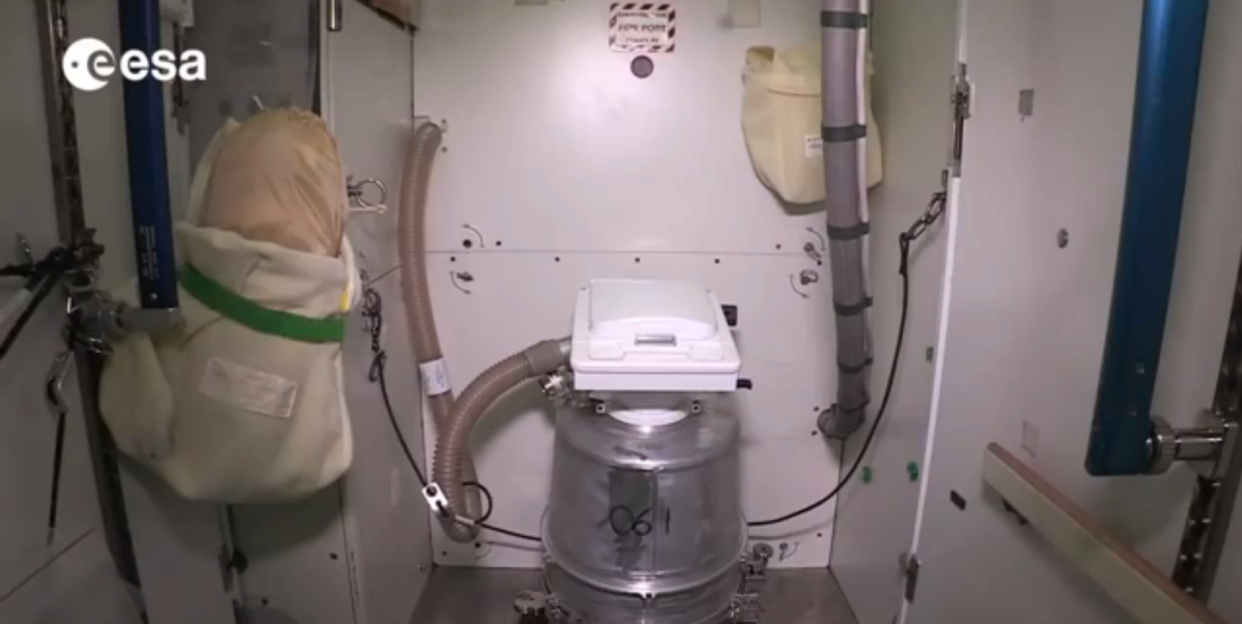The ISS Toilet Door Got a New High-Tech Coating Because Space Germs Don't Mess Around

The residents of the International Space Station try to keep the place as clean as possible, but humans will always bring bacteria with them. A new silver- and ruthenium-based antimicrobial coating is being tested on the space station to help reduce the risk of infection during extended space travel.
Bacteria play many crucial roles in human life, from supplying essential nutrients to helping with digestion. But bringing them into the void of space is a unnatural activity that can cause them to evolve in ways they wouldn't have on Earth.
"Spaceflight can turn harmless bacteria into potential pathogens," says Elisabeth Grohmann of Beuth University of Applied Sciences Berlin in a press statement about her study. "Just as stress hormones leave astronauts vulnerable to infection, the bacteria they carry become hardier-developing thick protective coatings and resistance to antibiotics-and more vigorous, multiplying and metabolizing faster."
The genes that cause these shifts can transfer from bacteria to bacteria, meaning that they can grow stronger together. It's a potential problem that could take a long-term spaceflight-say, on a trip to Mars-by surprise.
To counter the problem, Grohmann and her team of German and Russian scientists worked with a new antimicrobial coating called AGXX. Developed by German company Largentec Vertriebs, AGXX is described as a "bioactive contact catalyst," meaning that if "microorganisms in aqueous solution get near to the AGXX surface, the result is not only an accelerated inactivation of microorganisms, but also an efficient killing" through the destruction of the cell's walls, a process known as lysis.
"AGXX contains both silver and ruthenium, conditioned by a vitamin derivative, and it kills all kinds of bacteria as well as certain fungi, yeasts and viruses. The effects are similar to bleach, except the coating is self-regenerating so it never gets used up," Grohmann says.
Her team tested out the new coating in a place notably prone to bacteria: the bathroom door. According to studies, if the door is left uncleaned in a place like a public washroom, thousands of kinds of bacteria can emerge. A spaceflight would be a much different context, but that wouldn't change the nature of human waste.
The AGXX coating proved extremely effective. "After 6 months exposure on the ISS, no bacteria were recovered from AGXX-coated surfaces," Grohmann says. And the effect lasted. When researchers checked in after 12 and even 19 months, a measly 12 kinds bacteria were able to be recovered from the AGXX surface. That's an 80 percent reduction from bare steel.
In the short term, the AGXX coating is effective at keeping those aboard the ISS healthy. There was no particular threat to the team of American, Canadian astronauts and the Russian cosmonauts, but this just allows them to continue their focus on the scientific exploration, often through spacewalks. But in the long term, AGXX provides a promising coating for future trips.
"Immunosuppression, bacterial virulence and therefore infection risk increase with duration of spaceflight," Grohmann notes. Space travel to another planet is already a daunting enough task as it is. Keeping things clean makes it that much easier.
Source: Frontiers
('You Might Also Like',)


